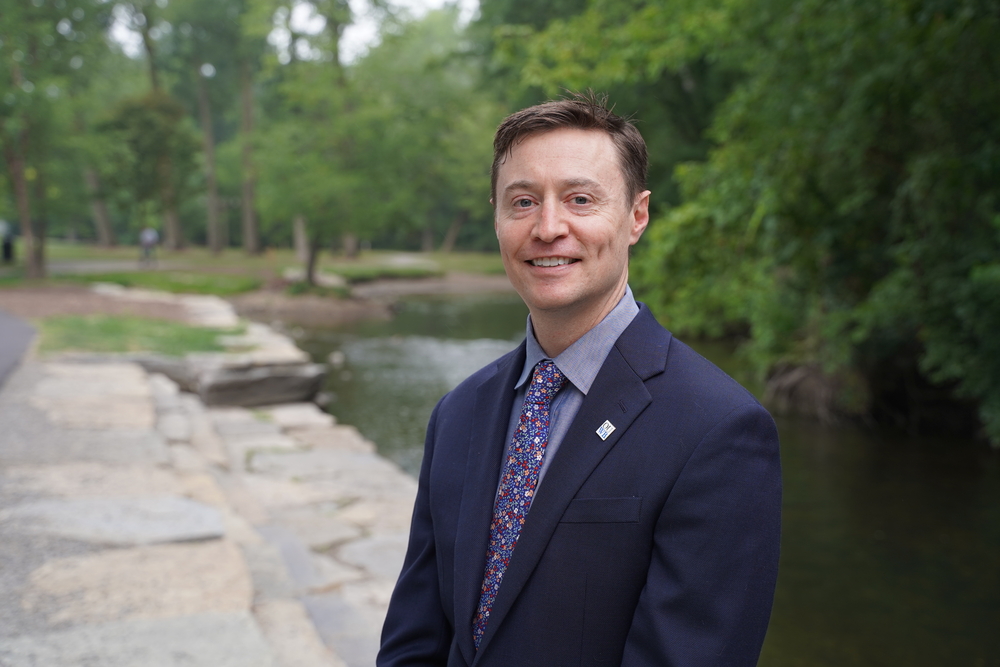
Abram Brummett, Ph.D., joined Oakland University William Beaumont School of Medicine in May 2020. An assistant professor in the Department of Foundational Studies, Brummett teaches medical humanities and clinical bioethics. Aside from teaching, Brummett serves on the scholarship and curriculum committees at OUWB and as a clinical ethics consultant for Corewell Health.
Prior to joining OUWB, Brummett received a doctorate in health care ethics from Saint Louis University, a master’s in history from Murray State University, and a master’s in philosophy from the University of Missouri - St. Louis. Additionally, he completed a clinical ethics fellowship in the Alden March Bioethics Institute at Albany Medical College. Additionally, before his involvement in the field of bioethics, Brummett’s work as a U.S. Peace Corps Volunteer brought him to the College of Micronesia, where he taught philosophy, history, and English.
1. Did any specific moment make you want to go into medicine?
What drew me to medical ethics was the applicability of the problems ethicists think about. The views developed by medical ethicists on decision-making capacity, deception, medical futility, fair allocation of scarce resources, etc., directly influence high-stakes decisions that get made in hospitals around the U.S. Medical ethics is a very theoretical discipline, but it is not only a theoretical discipline.
2. What is your favorite part about teaching?
I love pulling students into the philosophical drama of a topic and challenging them to evolve their views. Since I have been at the medical school for a few years now, I have also really enjoyed publishing with our students in bioethics and clinical journals. It proves to them that they too have something important to contribute to these discussions, and I hope that primes them to continue contributing for the rest of their careers.
3. If you didn’t go into medicine or teaching, what field do you think you would have gone into?
I would have been an evolutionary psychologist, for which OU has an excellent graduate program. As an ethicist, I've always been curious about the ultimate origins of our moral intuitions, and evolutionary psychologists can contribute an important piece of that story.
4. Does anything in particular about OUWB’s mission, values, or environment particularly resonate with you?
It's the community of medical students, faculty, and staff. I remember coming for my on-campus interview in 2019 and feeling an instant sense that I was somewhere I wanted to be. My time at OUWB has proven that intuition correct. OUWB is a place where people push one another to be excellent but know that being excellent goes well beyond good grades and research publications.
5. You previously taught in Micronesia. What was that experience like, and did you learn anything in this role that you took with you in your work in bioethics?
Teaching in Micronesia as a member of the U.S. Peace Corps forced me to confront my biggest fear — public speaking. I still have to manage my public speaking anxiety, but I decided back then that I would never let it stand in the way of pursuing my dream to be a college professor. I open one of my lectures with three stories from my time in Micronesia that illustrate the limits of moral relativism, a view that is common in our society today. My purpose in telling those stories is to demonstrate that while it is important to be respectful of diverse moral perspectives, most of us still have our limits.
6. Could you tell us a fun fact about yourself that not many people at OUWB might know about?
My first six months at OUWB coincided with the outbreak of the COVID pandemic, an especially socially isolating time for a single guy who moved here from out of state. However, during that time, I managed to go on some socially distanced walking dates with a wonderful woman (an OU alumnus no less) that I recently married. Michigan started out weird, but it's really been great, and I plan to stay for a long time.
To request an interview, visit the OUWB Communications & Marketing webpage.
This work is licensed under a Creative Commons Attribution-NonCommercial 4.0 International License.

